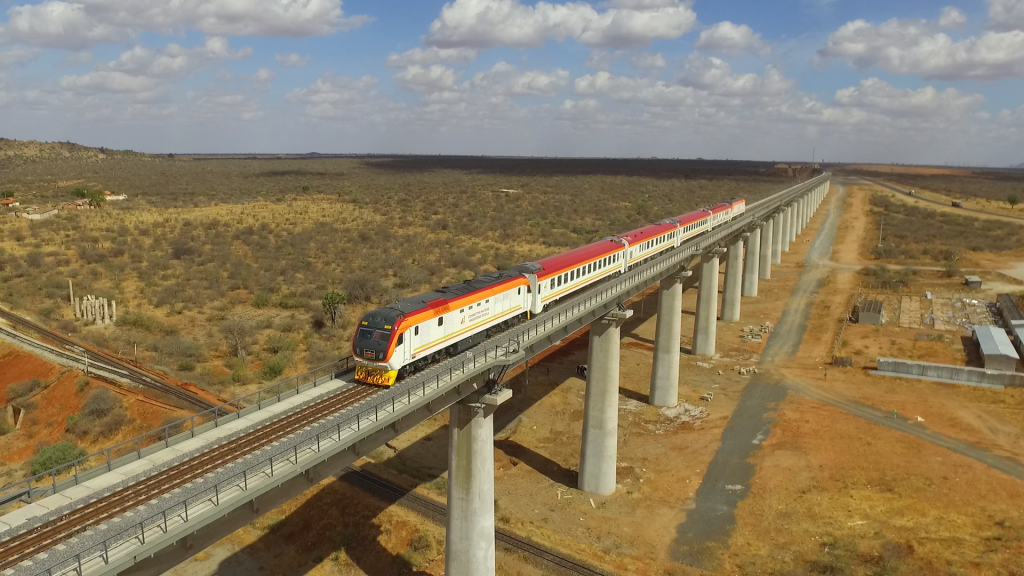The Report Inquiry into the Use of SGR, which was presented to the Kenyan parliament on September 22, suggests the immediate renegotiation of operating costs with SGR operator Africa Star Railway Operation Company (Afristar), which it says should be reduced by 50%.
At present, the Kenyan government pays a fixed quarterly fee of Shillings 3.1bn ($US 28.6m) for the operation of SGR to Afristar, a subsidiary of the China Communications Construction Company (CCCC) which built the line. The committee hopes these payments can be reduced to around Shillings 1.5bn per quarter.
SGR has operated at a combined loss of Shillings 21.68bn since the opening of the initial 472.3km Mombasa - Nairobi section in May 2017, receiving Shillings 25.03bn in revenue for the period, compared with Shillings 46.71bn in costs incurred. Due to this, Kenya Railways (KR) has defaulted on payments to Afristar worth an estimated Shillings 40bn.
The report also recommended the renegotiation of loans borrowed in 2014 from China’s Exim Bank to fund SGR, “due to the prevailing economic distress occasioned by the effects of Covid-19.”
Repayments under the current arrangement rose to Shillings 71.4bn this financial year. Kenya began repayments in 2019 following the expiry of a five-year grace period.
Other recommendations made by the committee to reduce losses incurred through the operation of SGR include:
- the implementation of measures to improve the utilisation of KR assets including land and rolling stock, with income accrued from these assets put towards the payment of the SGR loan
- the introduction of policies to enable competitive, privately funded rail operation and last-mile rail network expansion on Kenya’s network to reduce incurring further government debt, and
- the implementation of an additional 0.28% surcharge for the Railway Development Levy (RDL) for road freight users to incentivise a modal shift towards use of the SGR for freight, on top of the present 2.5% levy.
The report follows criticism by members of parliament (MP) towards government directives designed to ensure that containerised freight on the corridor is carried via SGR, and that all freight is transported through the newly-established Naivasha Inland Container Depot (ICD). Both directives have since been rescinded, following concerns that they violated the spirit of a free market economy.
“Forcing use of rail goes against the Competition Act and the spirit of a liberalised market economy,” the report says. “It also goes against the International Maritime Laws and World Trade Organisation (WTO) treaties that allow freight owners to choose the mode of transport that is competitive in their view.”
“The use of this strategy has not only increased the cost of doing business because of the high cost of transporting freight, but has also threatened Kenya’s position as the region’s logistical hub.”
The report follows a ruling by the Kenyan Court of Appeal on June 26, which found that the Shillings 500bn contract agreed between KR and CCCC for the construction of SGR was made illegally, due to the deal being completed without sufficient regard for the country’s competition and procurement laws. The verdict overturned a decision to dismiss the case made by then-High Court judge, Justice Isaac Lenaola (now a member of Kenya’s Supreme Court) in November 2014.
The verdict has cast doubt over the legitimacy of the debts owed to CCCC, and may pose a challenge to Kenya’s attempt to renegotiate operation fees.
If renegotiations are successful, Kenya will be the second African country to renegotiate infrastructure loans with China. In September 2018, Ethiopia successfully renegotiated a loan for its $US 4bn Addis Ababa - Djibouti railway, extending repayments from 10 years to 30.

